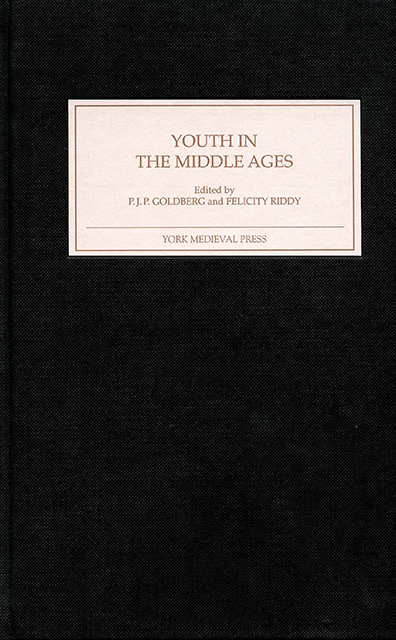Book contents
- Frontmatter
- Contents
- List of Contributors
- Introduction: After Ariès
- Childhood and Youth in the Early Middle Ages
- Jewish Society under Pressure: The Concept of Childhood
- Desiring Virgins: Maidens, Martyrs and Femininity in Late Medieval England
- Out of the Mouths of Babes: Authority in Pearl and in Narratives of the Child King Richard
- A Safe-Haven for Children? The Early Humiliati and Provision for Children
- Migration, Youth and Gender in Later Medieval England
- Good Advice on Leaving Home in the Romances
- ‘Youth on the Prow’: Three Young Kings in the Late Viking Age
- Index
- York Medieval Press: Publications
A Safe-Haven for Children? The Early Humiliati and Provision for Children
Published online by Cambridge University Press: 25 March 2023
- Frontmatter
- Contents
- List of Contributors
- Introduction: After Ariès
- Childhood and Youth in the Early Middle Ages
- Jewish Society under Pressure: The Concept of Childhood
- Desiring Virgins: Maidens, Martyrs and Femininity in Late Medieval England
- Out of the Mouths of Babes: Authority in Pearl and in Narratives of the Child King Richard
- A Safe-Haven for Children? The Early Humiliati and Provision for Children
- Migration, Youth and Gender in Later Medieval England
- Good Advice on Leaving Home in the Romances
- ‘Youth on the Prow’: Three Young Kings in the Late Viking Age
- Index
- York Medieval Press: Publications
Summary
Some time in the early 1190s a knight, identified only as ‘B’, who had been cured of a severe illness, decided to enter the religious life in the monastery from which he held his land. He also required his under-age son to take the habit as a monk. Unfortunately, the boy did not adapt to the monastic life and, having reached the age of ‘discretion’, after only ten weeks he absconded. With the support of other relatives he then claimed his father’s goods back from the abbot. The relatives swore that the boy had been under age and unwilling when he took the habit and, on encountering resistance from the abbot, took the case to the papal curia. In 1195 Pope Celestine III (1191–98) ruled that if it were true that the boy had not been willing to be professed and had left the monastery when he had attained the age of discretion, he was to be considered free and was not to be compelled to return to the monastery. He was also free to demand the goods of his father which belonged to him by succession. Celestine’s decision was of such significance that it was included in the Decretal collection drawn up for Gregory IX (1227–41) and established as a precedent for later disputes.
This case raises interesting questions about the relationship between parental responsibility and religious vocation. In this episode there were other relatives who could help the boy and seem to have done so with some vigour, pursuing his cause all the way to the pope. But the dispute also reveals the dilemma for the parent who wished to do something for the good of their soul and yet had responsibility for children. The knight wished to take the habit and resolved the problem of his son as he saw fit. Presumably, as eventually happened in this case, relatives might quite often take on the children of such individuals. But what if there were no relatives? Oblation, in spite of a slight waning in popularity from the twelfth century, remained a common way of providing for children.
- Type
- Chapter
- Information
- Youth in the Middle Ages , pp. 73 - 84Publisher: Boydell & BrewerPrint publication year: 2002



